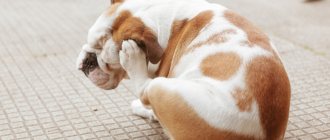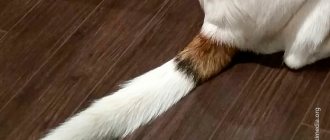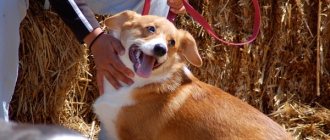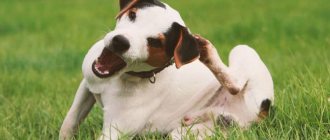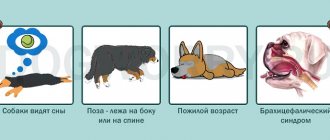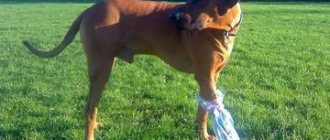Among dogs, as among people, there are small eaters and gluttons. Each owner knows his pet, how much he eats and what foods he likes most. When, for unknown reasons, a pet eats poorly or completely refuses food, even previously loved food, this should be a cause for concern for the owner. Let's figure out how to increase a dog's appetite and determine the reasons for its absence, in which cases you can cope on your own, and when you should seek qualified help.
Causes of lack of appetite
There can be many reasons for decreased appetite or loss of appetite in dogs, but they all fall into two categories: behavioral and physiological.
Behavioral
If a hunger strike is declared without visible symptoms of illness, this is most likely a behavioral disorder. It can be caused by any event in the dog’s life that does not fit into the framework of normal life:
- a change of environment caused by a move, a strange apartment, new smells, interior items can cause a psychological reaction in impressionable pets, discomfort, and refusal to eat;
- separation from the owner - a vacation or a long business trip during which the dog is left in foster care or with friends; illness or death of the owner often causes a depressed psychological state, depression, loss of appetite;
- the appearance of a new family member in the house - a wedding or the birth of a child can provoke jealousy, depression, apathy, and refusal to eat;
- the appearance of another pet - the decision to get another dog, cat or any other pet can be perceived as a personal insult, causing jealousy, depression, a desire to hide from everyone, and lack of appetite;
- increased attention - if the dog does not have the opportunity to eat in peace, someone is constantly nearby or there are distractions;
- the need to share a bowl with another pet can also cause a decrease in appetite;
- odor – a poorly washed bowl or a strong smell of detergent can discourage you from eating from it.
Apart from perhaps a slight lethargy, this behavior has no obvious external signs.
Physiological
A dog's loss of appetite is often directly related to a health condition. Symptoms characteristic of a particular illness help determine the true reason why a pet refuses to eat:
- Worm infestation and parasites - the dog is lethargic, apathetic, and may refuse not only food, but also long walks. Digestive upset appears in the form of vomiting and loose stools. The quality of the wool deteriorates, it becomes dull and dry.
- Poisoning – food poisoning from low-quality products causes vomiting, stomach upset, refusal to eat, and in severe cases, weight loss. This is a short-term phenomenon and, if timely measures are taken, does not pose a threat to the life of the animal.
- Improperly formulated diet - prolonged consumption of food high in protein is manifested by external signs, such as changes in the color and smell of urine, the appearance of dandruff, and bald patches on the ridge and tail. In advanced forms it can lead to kidney failure.
- Intoxication with chemical or medicinal substances is a severe, fast-acting form of poisoning that causes a reaction in the gastrointestinal tract, cardiovascular and central nervous systems.
- Enteritis is an infectious intestinal disease that in most cases affects puppies and adolescents under one year of age. Refusal of food is accompanied by lethargy, refusal of water, and fever. The dog reacts painfully to pressure in the stomach area and tucks its tail. In its advanced form, uncontrollable vomiting and diarrhea with a strong unpleasant odor appear.
- Diseases of the oral cavity - inflammation of the gums, mucous membranes, stomatitis, caries, gingivitis, periodontitis and periodontal disease cause the dog discomfort and even pain while eating, which can make him refuse food. The appearance of an odor from the mouth, drooling, reddening of the gums or inflammation of the lymph nodes are symptoms of these diseases.
- It happens that loss of appetite becomes the first symptom of the development of serious diseases, such as oncological, endocrinological, cardiac and pulmonary.
If your pet exhibits any of the above signs, contact your veterinarian immediately.
Dirty or alien
A puppy may refuse to eat from a bowl if it smells foreign or simply unfamiliar and unpleasant odors. A typical situation: you washed the bowl using detergent, but you didn’t wash it well enough, which is why the dog smells chemicals and refuses to eat from such dishes.
There are cases when pets are very respectful and kind to other people's property and prefer to eat exclusively from their own bowl. In these cases, it will be enough to wash and rinse the bowl well in order to get rid of foreign odors.
Interesting: The most charming dog breeds - list, description, photos and videos
Natural causes
A common reason for refusing to eat is the food itself. Just like people, dogs have eating habits, preferences, favorite and disliked foods. Your pet may suddenly be picky when choosing food. If you pamper your pet with treats from your table, then over time this can lead to the fact that the dog will ignore his bowl, expecting treats from you.
A sudden change in the usual diet (natural to dry food and vice versa) can lead to rejection of new food and, accordingly, partial or complete loss of appetite. Also, too large or very small fractions of food may not suit the dog, which will lead to refusal.
Older dogs and dogs with insufficient exercise require less energy and therefore less food. Failure to comply with the diet (overfeeding) and resulting refusal of food should not be confused with a deterioration in appetite. Many pets eat significantly less during the hot season. A bitch during estrus and before giving birth can also eat very little. Often after vaccination, the dog loses its appetite and looks a little lethargic for 1-3 days. If after this time the pet returns to its normal mood and desire to eat tasty food, then everything is fine.
Stress
Like people, dogs are subject to various stresses. They have a hard time experiencing loneliness, a change of place of residence or the loss of an owner. If there is stress in a pet’s life, it needs to be eliminated or the dog must be adapted to the factor that is bothering it. In particularly advanced cases, you will need to contact a specialist and further use of plant-based sedatives. In any case, it will take some time to adapt.
Interesting: How do dogs see? Do dogs see colors? Description, comparison with a person, photos and videos
What to do if the dog doesn't eat
If there are no visible reasons for concern or obvious symptoms of illness, you should try to increase your dog’s appetite on your own. First of all, it is important to establish a correct and strict feeding regimen. The number of meals and the interval between them depends on the age of the pet. An adult dog needs two times a day, at approximately equal intervals. At the same time, it is necessary to limit free access to food. That is, the bowl should be in front of the dog for 20-30 minutes. If during this time the pet has not eaten the entire portion, remove it. A few days of this regime will teach the dog to eat at the time when food is given to it.
How to increase the desire to eat dry food? You can diversify it, enhancing the smell and taste. Add a few spoons of wet food or special meat sauce for animals to the regular portion. You can pour a little warm water into the bowl to soften the dryer slightly. Store granules at room temperature in a tightly closed container. If stored improperly, dry food loses its smell and attractiveness to the animal. Try changing the brand of food. But this needs to be done gradually, replacing a small portion of the portion at each feeding. The transition may take 7-10 days.
Try to diversify your natural diet by changing combinations of products and their quantities in a serving. Offer your pet's favorite foods in small quantities along with other ingredients. Alternate food - do not give the same thing 2 or more times in a row. Using the elimination method, remove foods that your dog does not like from the diet.
How to increase a dog's appetite if there are several pets in the house? Try feeding her separately from the others - in a different room or at a different time. Although in some cases it is competition that forces pets to eat their entire portion. A radical method that is not suitable for every owner of a four-legged friend is fasting. The dog is given only water for 24 hours. As a rule, after this the pet happily eats its portion. As a last resort, you can skip only one feeding.
You can increase the appetite of a healthy dog by increasing physical activity - a long walk and active play in the fresh air require a lot of energy. The dog will definitely be hungry and eat well when he returns home.
Light food
As with foodborne intoxication in humans, all food for dogs after poisoning is divided into:
At the same time, due to the canine nature, the concept of light food for humans and animals differs. For the latter, the optimal food in the first days is considered to be:
- lean meats like beef,
- chicken fillet,
- liquid porridge cooked in broth.
From cereals for porridges the following are welcome:
Only after the owner is convinced that the pet is recovering smoothly can other food products be added. But the partial lifting of the ban does not indicate that the dosage will now be uncontrolled. The furry patient will be allowed to eat in moderation:
- chicken eggs,
- low-fat cottage cheese,
- beef liver,
- boiled carrots,
- boiled beets,
- sea fish,
- butter.
In order not to overload the still weakened digestive system, at the preliminary stage of cooking all meat and fish should be ground in a meat grinder. Only after this can you send them to cook.
Separately, you need to dwell on the rules for assimilation of chicken eggs. The yolk can be given to the dog even raw. But this is provided that the eggs are from a household, or you are completely confident in their quality. But it’s better not to give protein raw. It needs pre-cooking. The liver is issued according to the same principle. If you don’t want to cook it, you can give the product raw. But this is only after a person is convinced of its quality and the absence of parasites. To do this, you can request a certificate of sanitary control.
Apart from butter, which is given in strictly limited quantities, other fats are contraindicated at first.
As for other food products, you should not give up raw foods completely. They contribute to the speedy recovery of the body, as they act:
- stimulants for the production of gastric juice;
- catalysts for creating favorable microflora;
- develop intestinal peristalsis.
When to contact a veterinarian
If a dog refuses his favorite treat, does not eat for no apparent reason (all of the above) for 2 days, this is a reason to contact a veterinarian. The doctor will examine the mouth, throat, palpate the abdomen, do an ultrasound if necessary, and take blood tests. This will help identify the cause of the lack of appetite.
You can increase your appetite during illness by using medications aimed at eliminating the cause and symptoms of the disease. Only the attending physician who is familiar with the picture of the disease and the current condition of the dog can prescribe medications.
After an illness, a vitamin complex and a special diet prescribed by your doctor will help restore your appetite and gain weight.
